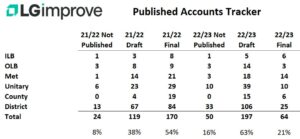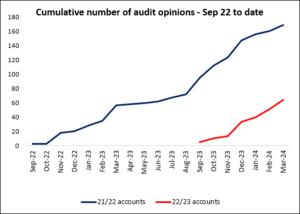As the backstop date for the publication of all outstanding accounts approaches, sector professionals think it is ‘unlikely’ to be cleared by 30 September or, if it is, the process won’t be done with much elegance.
Only 21% of local authority audits have been finalised for 2022/23, with 63% awaiting sign off and 16% unpublished, according to the latest published accounts tracker by LG improve.
The tracker also revealed that for 2021/22 54% of audits have been signed off, 38% remain as drafts, and 8% are yet to be published. In total this means that around 390 audits for the last two financial years are yet to be finalised.
In February, the government launched a consultation on the best way to clear the backlog in local authority audit, which outlined measures to “reset” the system through a backstop date of 30 September 2024 to publish accounts for all outstanding years up to and including 2022/23. If accounts are not finalised by this deadline disclaimers of opinion will be issued.
The government are yet to release the outcome of the consultation on addressing the local audit backlog.
Commenting on the latest published accounts tracker, Dan Bates, director at LG improve, told Room151: “Although the last few months have seen a steady flow of audit completions, it seems unlikely that the backlog will be cleared by the backstop date. Many authorities which have worked hard to bring accounts up to date will only receive disclaimed opinions by 30 September.”

‘Difficult to make predictions’
However, some in the sector, such as Stephen Sheen, director of consultant Ichabod’s Industries, said that it is “difficult” to make any predictions on whether the audit backlog will be cleared by the backstop date, “as there doesn’t appear to be any co-ordination of the audit firms”.
“They [audit firms] have been given discretion to make their own decisions about how scarce audit resources are to be deployed in the run-up to the first backlog date. Some authorities have already been told that they will have no further visits from the auditor before 30 September, whereas other authorities are having their Is dotted and Ts crossed to enable a full sign-off.
“There is no recommendation of a minimum level of work that should be carried out at each authority or to complete the audits of authorities that are due to have a change of auditors for 2023/24,” Sheen told Room151.

He explained that this is “especially concerning” as there is a lack of guidance from the government on what happens once an audit has been disclaimed.
Sheen said: “Whilst some of the content of a set of financial statements can be junked, the majority of it will be carried forward into the financial statements for the following year.
“In order to secure a clean audit opinion, the audit work will need to catch up the necessary assurance for the carried forward figures, which will become increasingly difficult as documentation becomes harder to track down and memories of those involved fade.”
Previously, Sheen explained that in the circumstances of a disclaimed opinion, it is uncertain how an authority would get any benefit from audit work that has been carried out, except to the extent that the evidence can be carried forward to assist the audit of the following years.
“So, it is impossible to say what might happen over the next six months, apart from doubting that there will be much elegance,” Sheen added.
—————
FREE bi-weekly newsletters
Subscribe to Room151 Newsletters
Follow us on LinkedIn
Follow us here
Monthly Online Treasury Briefing
Sign up here with a .gov.uk email address
Room151 Webinars
Visit the Room151 channel











